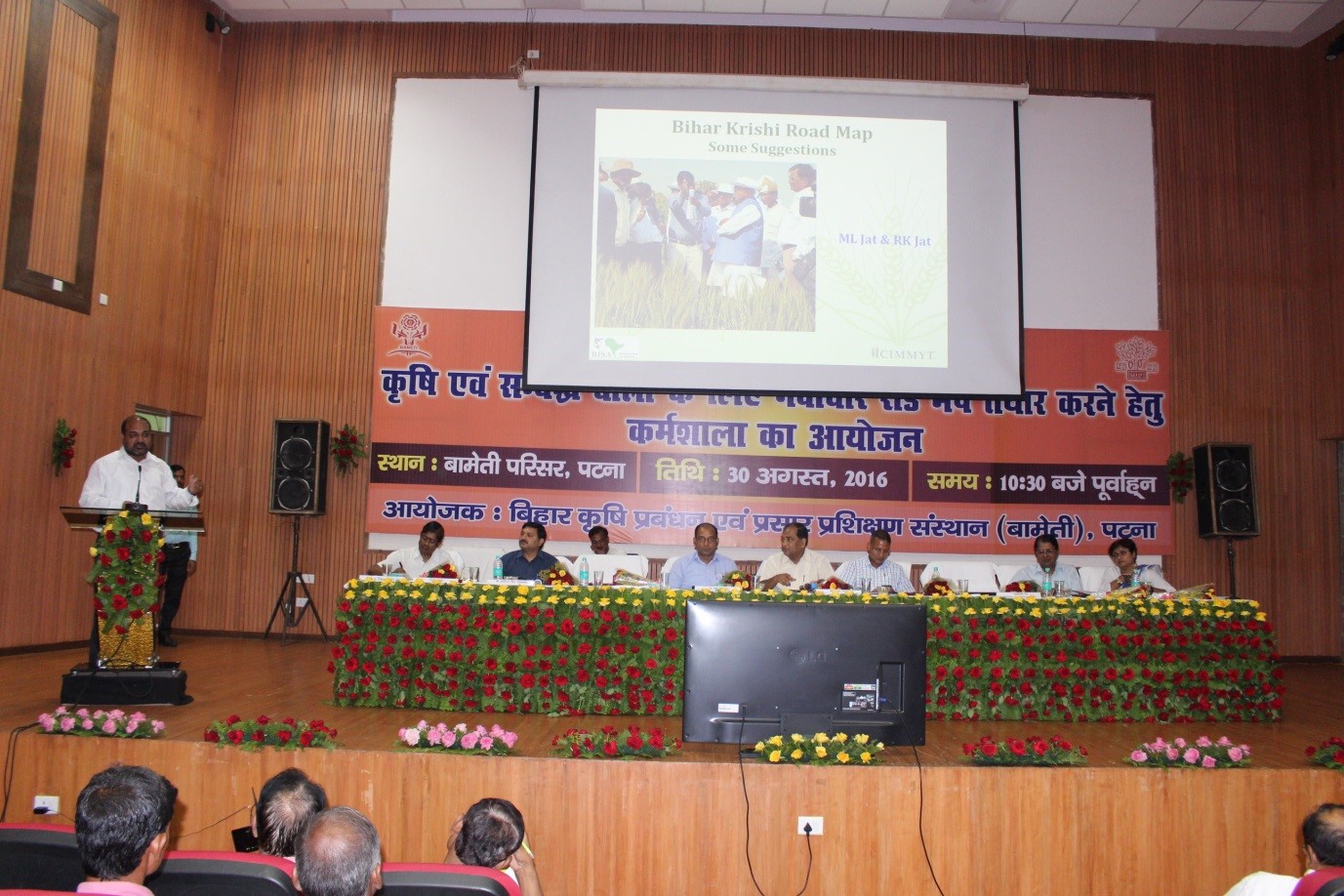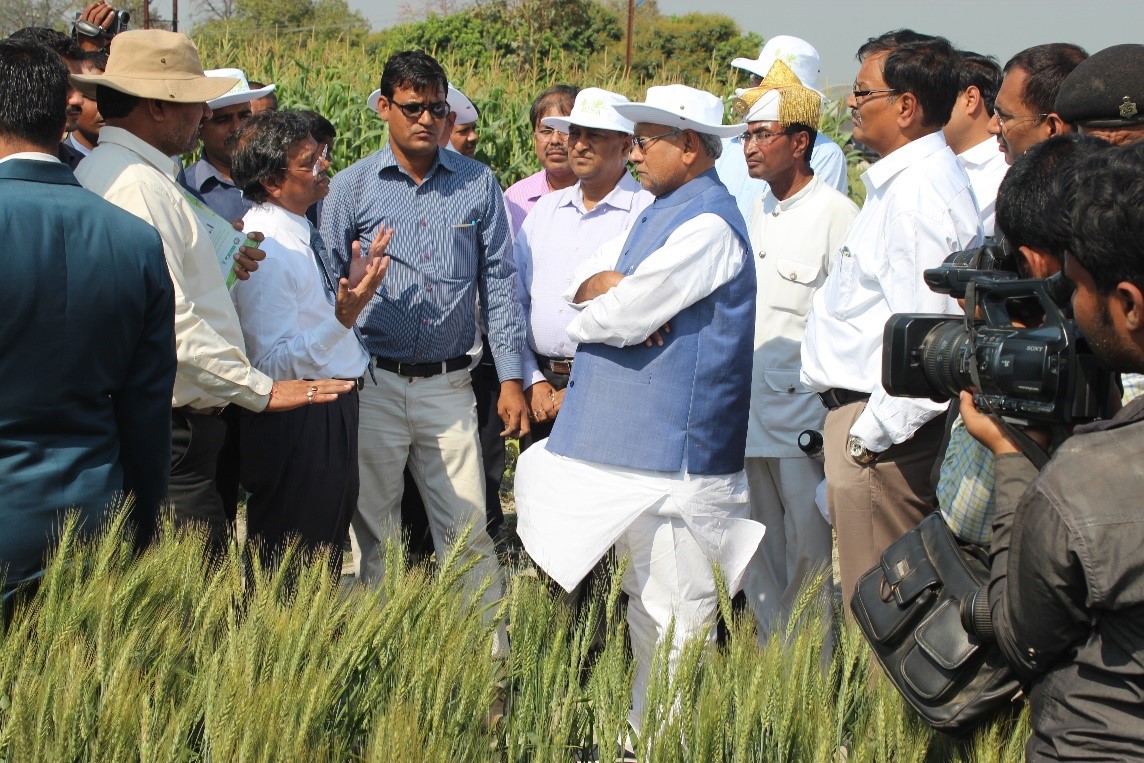
BIHAR, India (CIMMYT) — Rich endowment of fertile soil, adequate rainfall and sufficient ground water makes agriculture key to the overall development of the economy of the state of Bihar in India. Farm mechanization to enhance cropping intensity, reduce labor requirements and improve farm production efficiency is a vital policy initiative taken by Bihar’s Department of Agriculture to address the shrinking area under cultivation. Although the state government has accorded top priority to agriculture, the action plan (the so-called Krishi road map) it has prepared for the agriculture sector does not include a strategy for climate change mitigation.
Extreme climatic vulnerability keeps Bihar’s agricultural productivity low. It is the only state in the country where drought and flood recurrently occur at the same time. To overcome these adverse conditions, the government of Bihar is trying to re-orient agriculture by enacting diversification policies and other measures such as irrigation, flood control and drainage schemes. It has also been involved in climate-smart agriculture (CSA) work and pilot climate-smart villages (CSVs) undertaken by CIMMYT and the Borlaug Initiative for South Asia (BISA) and other collaborators. Concerns about climate change challenges were shared by Nitish Kumar, Bihar’s chief minister, with CIMMYT Director General Martin Kropff during his recent visit to Bihar. They also discussed local community collaboration with researchers, policymakers and scientists on establishing a strategic approach to scale sustainable intensification based on conservation agriculture.
Throughout 2016, traveling seminars and workshops were organized in CSVs to disseminate knowledge about climate-smart agriculture practices (CSAPs). Highlighted at these events were the benefits of direct-seeded rice, laser land leveling, bed planting, residue management, site-specific nutrient management, the GreenSeeker sensor, zero tillage, crop diversification, intensification with legume incorporation, information & communications technologies and weather forecasting. During a stakeholder consultation in September 2016 led by Vijoy Prakash, Bihar’s Agriculture Production Commissioner, CIMMYT-BISA shared its CSA experiences. Addressing the need to incorporate climate change into the Krishi road map, the Chief Minister and other senior government officials visited the CSA research sites at BISA-Pusa and the CSV pilots in Samastipur District implemented by CCAFS, CIMMYT and BISA. Bihar’s Agriculture Minister Vijay Kumar Choudhary also visited 30 CIMMYT-BISA pilot CSVs in Samastipur and Vaishali Districts.

The Bihar Agricultural Management and Training Institute (BAMETI) issued a letter to CIMMYT stating that the government of Bihar plans to implement CSA and CSVs in all 38 districts of Bihar. BAMETI is responsible for organizing need-based training programs for the farming community. The Bihar’s Department of Agriculture is also preparing a proposal to introduce CSAPs to improve the resilience of farmers by mainstreaming CSVs in Bihar with technical and strategic support from CIMMYT, BISA and CCAFS in collaboration with Rajendra Agricultural University, Bihar Agricultural University and the ICAR research complex for the eastern region. Based on the success of CSVs, the linkages with CIMMYT will help fulfill Bihar’s innovative Krishi road map. Commending the work done in farmers’ fields and its relevance for addressing climate challenges from a farming systems perspective, Chief Minister Kumar sent a letter to CIMMYT’s DG on the occasion of CIMMYT’s 50th anniversary.
Since then, several field days, workshops and meetings have been conducted by CIMMYT-BISA in collaboration with other partners to fulfill the Krishi road map. On October 7, 2016, a field day on “Direct-Seeded Rice in Climate-Smart Villages’’ was held at CSV Digmbra with more than 300 farmers, service providers, NGOs, private companies and state agriculture department representatives participating, as well as scientists from Krishi Vikas Kendra University and CIMMYT.
Among the subjects discussed were CSA interventions implemented through innovative partnerships with farmers and farmer cooperatives to build farmers’ resilience to climate change and increase their productivity and incomes, while mitigating greenhouse gas emissions from agriculture. Samastipur’s district magistrate reported that the government of Bihar is supporting farmers’ adoption of improved technologies by providing them with subsidies for mechanization, irrigation and improved seed. Finally, several progressive farmers shared their experiences with climate-smart practices and encouraged other farmers to adopt them in order to improve their livelihoods.
 Capacity development
Capacity development